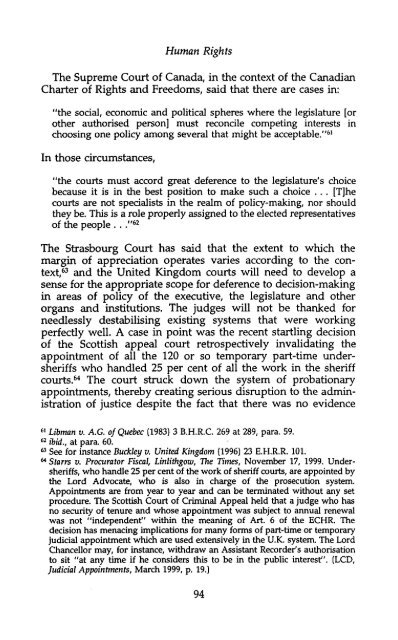HAMLYN - College of Social Sciences and International Studies ...
HAMLYN - College of Social Sciences and International Studies ...
HAMLYN - College of Social Sciences and International Studies ...
You also want an ePaper? Increase the reach of your titles
YUMPU automatically turns print PDFs into web optimized ePapers that Google loves.
Human Rights<br />
The Supreme Court <strong>of</strong> Canada, in the context <strong>of</strong> the Canadian<br />
Charter <strong>of</strong> Rights <strong>and</strong> Freedoms, said that there are cases in:<br />
"the social, economic <strong>and</strong> political spheres where the legislature [or<br />
other authorised person] must reconcile competing interests in<br />
choosing one policy among several that might be acceptable." 61<br />
In those circumstances,<br />
"the courts must accord great deference to the legislature's choice<br />
because it is in the best position to make such a choice , . . [T]he<br />
courts are not specialists in the realm <strong>of</strong> policy-making, nor should<br />
they be. This is a role properly assigned to the elected representatives<br />
<strong>of</strong> the people . . ."«<br />
The Strasbourg Court has said that the extent to which the<br />
margin <strong>of</strong> appreciation operates varies according to the context,<br />
63 <strong>and</strong> the United Kingdom courts will need to develop a<br />
sense for the appropriate scope for deference to decision-making<br />
in areas <strong>of</strong> policy <strong>of</strong> the executive, the legislature <strong>and</strong> other<br />
organs <strong>and</strong> institutions. The judges will not be thanked for<br />
needlessly destabilising existing systems that were working<br />
perfectly well. A case in point was the recent startling decision<br />
<strong>of</strong> the Scottish appeal court retrospectively invalidating the<br />
appointment <strong>of</strong> all the 120 or so temporary part-time undersheriffs<br />
who h<strong>and</strong>led 25 per cent <strong>of</strong> all the work in the sheriff<br />
courts. 64 The court struck down the system <strong>of</strong> probationary<br />
appointments, thereby creating serious disruption to the administration<br />
<strong>of</strong> justice despite the fact that there was no evidence<br />
61 Libman v. A.G. <strong>of</strong> Quebec (1983) 3 B.H.R.C. 269 at 289, para. 59.<br />
62 ibid., at para. 60.<br />
63 See for instance Buckley v. United Kingdom (1996) 23 E.H.R.R. 101.<br />
64 Starrs v. Procurator Fiscal, Linlithgow, The Times, November 17, 1999. Undersheriffs,<br />
who h<strong>and</strong>le 25 per cent <strong>of</strong> the work <strong>of</strong> sheriff courts, are appointed by<br />
the Lord Advocate, who is also in charge <strong>of</strong> the prosecution system.<br />
Appointments are from year to year <strong>and</strong> can be terminated without any set<br />
procedure. The Scottish Court <strong>of</strong> Criminal Appeal held that a judge who has<br />
no security <strong>of</strong> tenure <strong>and</strong> whose appointment was subject to annual renewal<br />
was not "independent" within the meaning <strong>of</strong> Art. 6 <strong>of</strong> the ECHR. The<br />
decision has menacing implications for many forms <strong>of</strong> part-time or temporary<br />
judicial appointment which are used extensively in the U.K. system. The Lord<br />
Chancellor may, for instance, withdraw an Assistant Recorder's authorisation<br />
to sit "at any time if he considers this to be in the public interest". (LCD,<br />
Judicial Appointments, March 1999, p. 19.)<br />
94

















